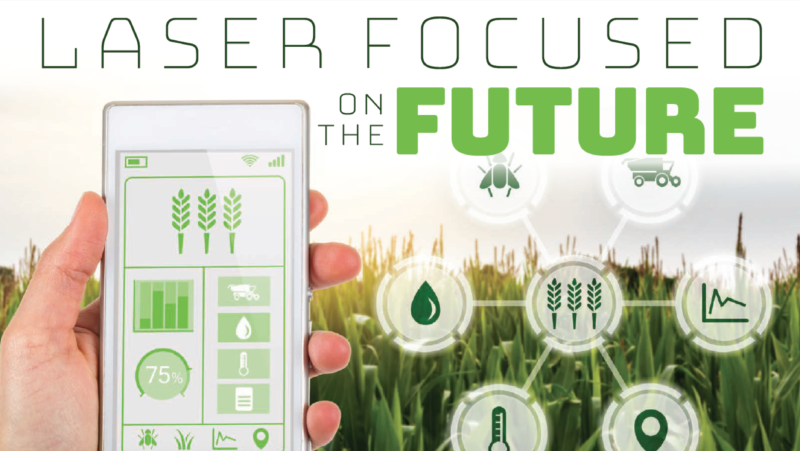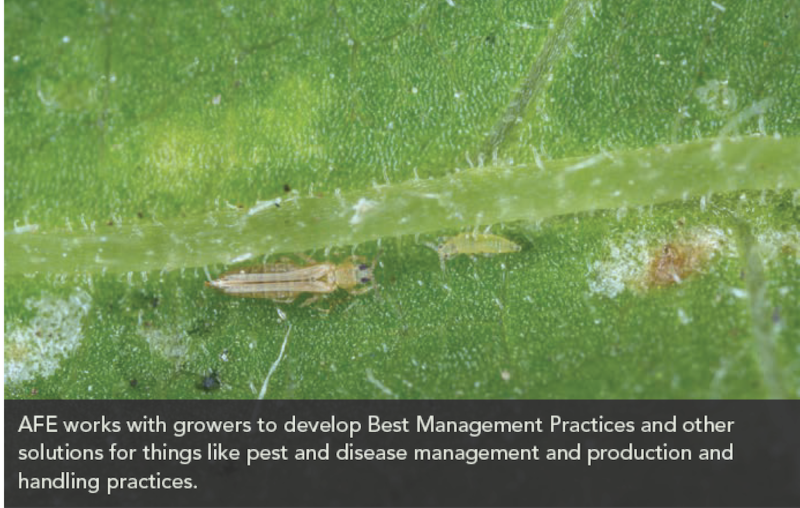
Management — Laser Focused on the Future
The start of a new decade stirs up the fortune teller in all of us, as we look back to predictions of the past and ponder what the future might bring. The arrival of 2020 may not have brought flying cars and floating cities, but it has seen the expansion of smart technology and robotics in homes and businesses. In the growing industry, advancements have automated tasks like grading and sticking cuttings and controlling greenhouse environments with phone apps.
As time marches forward, it’s reasonable to expect the science of growing to keep up. But where do those advances come from? When you adopt the latest dip recommendations to control thrips on your poinsettia cuttings, do you know how that information came about? Or when you use supplemental lighting to improve bedding plant plugs, have you ever wondered who figured that procedure out?
For 59 years, the American Floral Endowment (AFE) has been fueling many advances in flower growing technology. Like its logo of a tree with spreading, sheltering branches, AFE serves as an umbrella organization supporting all segments of the floral industry. Since its inception in 1961, the Endowment has been completely devoted to supporting flower growers, shippers, distributors and retail customers. Not one link of the floral industry chain is neglected, including consumers.
Growers recognize that the secret to gaining more flower-buying customers is delivering a superior experience. Meeting that goal demands up-to-date solutions using the latest technology to unravel the problems you face. The Endowment directs its resources to projects and programs that help growers be more successful — and every result is freely available to everyone on the website: Endowment.org.
SOLVING GROWER PROBLEMS
One of the key things AFE does is help solve the tough challenges you face in crop production. Research programs develop through conversations with growers, so that researchers are addressing the issues you’re grappling with day to day. This kind of research is visionary, looking to the future and delivering results you can use to grow your best crops ever.
It’s also transformative, changing how the industry grows and handles crops. You’re probably already using the results of Endowment-funded research in your growing practices on a daily basis. For instance, if you practice DIF and graphical tracking to help manage the height of any of your crops, you’re using information the Endowment helped fund.
 CONTROLLING AND MANAGING PESTS AND DISEASES
CONTROLLING AND MANAGING PESTS AND DISEASES
The industry is always seeking improved management practices for pests and diseases. The cost of battling pests and diseases has continued to rise, and pests and diseases have developed high levels of resistance to available pesticides. It’s a brewing crisis growers face daily.
To address these issues, the Endowment continues to support a wide range of pest control studies. These studies involve working with growers to identify Best Management Practices that reduce costs while providing more effective pest control.
For instance, growers consistently report that thrips are the most damaging insect problem they face, and botrytis is one of the most serious postharvest issues. In 2018, AFE created a special research fund for thrips and Botrytis. The goal is to identify effective, long-term solutions to control these pests.
This study came together because of the huge losses growers were experiencing and the need to identify effective solutions. By funding multiple research studies focused on potential solutions, growers can expect rapid progress on the problem. The potential for pest control and reducing pesticide applications is immense. Research is the key, and the Endowment is the sheltering, supporting tree that can bring all the pieces together.
PRODUCTION AND HANDLING PRACTICES
When consumers buy flowers and plants, they’re often impulse buys triggered by the product’s appearance and quality. These factors drive sales on the front end, but plant longevity and performance after purchase is what brings customers back. That’s why research on improving crops and reducing postharvest losses is so key to growing a strong customer base.
Pick a crop — impatiens, larkspur, rose, poinsettia and many more — and AFE-funded research helps improve production practices and postharvest longevity. For instance, both poinsettia bract edge burn and petunia flower decline are caused by a secondary infection. The initial problem in both is calcium deficiency (ethylene also plays a role in petunia flower decline). Research identified that carefully timed calcium sprays at the right concentration greatly minimizes or even eliminates these problems, saving growers from losses on finished crops.
Special focus remains on developing protocols for production, shipping and handling, and reducing ethylene damage for a host of crops, including cut flowers, flowering potted plants, bedding plants, specialty cut flowers, unrooted cuttings and potted foliage plants. Whatever you’re growing, you’ll find research results with a useful, how-to approach on Endowment.org.
ADDRESSING THE INDUSTRY LABOR SHORTAGE
Another challenge facing the industry is labor. If bringing top talent to your business is a priority, partner with AFE and you’ll be supporting scholarship and internship programs that help develop a knowledgeable, eager workforce. The Endowment supports over 25 university student scholarships and administers three separate internship programs annually — one of which is specifically for plant production.
The internship programs encourage students to study floriculture, develop awareness of business practices and get on-the-job training for three to six months prior to graduation. These young professionals are eager to get a jump on their careers, and growers who host these interns often benefit as many return to their internship host after graduation as new hires who are ready to hit the ground running.
MARKET RESEARCH AND CONSUMER BEHAVIOR
A partnership with the Floral Marketing Research Fund explores consumer purchasing behaviors related to flowers. From this research, you can learn all kinds of facts about why consumers select certain flowers, how they buy, where they buy, how to market to millennials and other generations, and how to make sure you’re growing what consumers want.
HOW TO ACCESS AFE INFORMATION
The best part of all — everything is available for free to anyone in the floral industry. The Endowment isn’t a members-only organization that only shares research results with members. The research programs are funded by the industry for the industry. Every program, advancement and resource has been made possible by industry visionaries who understand the value of giving back to the industry to create growth and development for generations to come.
To view final reports, webinars and other information that’s useful for production, handling and marketing decisions, visit the website: Endowment.org. Or reach out directly to AFE’s Research Coordinator Terril Nell (tnell@afeendowment.org) or Debi Chedester, AFE’s Executive Director (dchedester@afeendowment.org), to talk about issues affecting you.
The Endowment is committed to getting the information it is generating into the hands of head growers and staff. If you’re reading this article and have never received any information from AFE, reach out to get on our mailing list. Send your email address to dchedester@afeendowment.org, and we’ll add you to the special growers-only newsletter: Growing Further.
GET INVOLVED
Growers, owners and managers have a unique opportunity to help solve floral industry challenges by investing in the industry’s future. An industry is only as strong as those that support it. Simply put, without support, AFE can’t grow programs to support the future of the floral industry. How can you get involved?
Stay connected through our grower-only newsletter and website.
Sign up to be a host for interns — it’s a great way to recruit employees.
Let us know what challenges you’re facing. We’re here to help growers. We want to hear about critical industry needs that can lead to research projects with direct-to-the-industry value. We’ll be communicating with growers this year seeking suggestions for future program needs. Or reach out to us using the email addresses above.
Consider a tax-deductible contribution. Help fund the research that’s solving tomorrow’s problems today.
SIDEBAR
10 BENEFITS OF PARTNERSHIP
Partnering with the American Floral Endowment offers growers many different benefits, including:
- Get the latest research on pests, diseases and other production challenges.
- Gain access to young professionals through hands-on learning experiences and help prepare them to be successful workers in the floral industry.
- Increase awareness of opportunities and careers in the floral industry to faculty at colleges and universities, giving them material they can share with students.
- Help support students interested in floral studies through scholarships.
- Be part of providing education to industry members through floral industry programs.
- Support researchers who can address floral industry challenges.
- Discover market research to help understand floral consumers and buying habits.
- Learn about solutions from research programs that help the floral industry move forward and be more successful than ever.
- Be part of collaborating with other floral industry organizations to pool resources together for the good of the industry.
- Voice your production concerns and needs — and assist in directing research funding to help your business succeed.








 Video Library
Video Library 

















